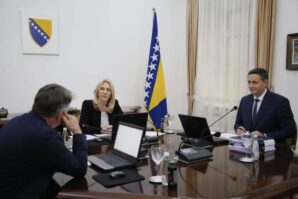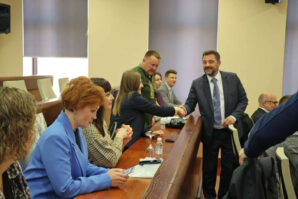
Fergus M. Bordewich, New York Times journalist who specializes in the area of international relations, published an article on Yugoslavia at that time in April 1986.
“When Tito died in 1980, after more than three decades at the nation’s helm, the world paid him homage. Heads of state flocked to his funeral. For his defiance of Stalin in 1948, Tito won the unflagging support of the West. For his loyalty to the international socialist cause, he secured the confidence of the East. For championing nonalignment, he earned the admiration of the developing world. In Yugoslavia, he was the paramount icon of nationhood, a figure of almost mythic proportions. He had unified a warring land, led his people to important achievements in education and industry and institutionalized a system of ”worker self-management” that Yugoslav Communists claimed was the essence of true socialism,” wrote Bordewich.
“What Tito failed to give Yugoslavia, however, was a lasting sense of national unity and purpose. He bequeathed to the nation a collective presidency, a body of nine members obliged to govern by consensus, who rotate yearly in the office of senior authority known as President of the Presidency. In addition, the Presidency selects a Prime Minister to serve a four-year term, though the position carries with it no independent authority,” as written in the article.
Although even today is officially forbidden to criticize Tito, his policies are responsible of the trouble of this country. In the early 1970s, his purge of liberals and innovators from the Communist Party left their mark.
“Yugoslavs trace most of their country’s current problems to economics. Indeed, a few simple statistics tell a dismal tale. Yugoslavia owes more than $20 billion to foreign banks and governments, putting it among the champions of international debt. Unemployment stands at 17 percent, the highest figure in Europe. The current inflation rate has climbed to 85 percent a year. Since 1980, the standard of living has declined by 30 percent,” wrote Bordewich.
In the foundations of the economy of Yugoslavia is Tito’s workers’ self-management, the idealistic program that has failed in practice and did not meet our promises. Managers are selected by an ideological key, and not the expertise.
The basic premise is that less is always better, and therefore the large public companies in the 1960s were atomized into smaller ones. State railways were broken in 350 different companies, each of which with its own self-management system.
In the name of ethnic autonomy, Tito left determining of the economic policies to individual governments of Republics. This led to the fact that each Republic made decisions in their own interest, without paying much attention to the country as a whole. Such a system has led to conflict, confusion, and inefficiency.

“Decentralization, along with economic stagnation, has rekindled age-old national jealousies. Serbs are prone to blame the ”selfishness” of the wealthier Croats for the country’s ills, and the Croats lay them at the door of alleged Serb ”hegemonism.” Affluent Slovenes complain that poverty-stricken Kosovo and Macedonia are a ”bottomless pit” for their ”foreign aid,” and Macedonians rail at the Serbs and Hungarians of Vojvodina for selling their grains abroad. ”People in every republic now feel that each decline in their standard of living is the result of their exploitation by the other republics,” explained Branko Puharic, a hardline official of the Croatian government. Of all the ethnic antagonisms in Yugoslavia, the most volatile is that of the Albanians of Kosovo. They number 77 percent of the province’s population, and their birthrate is the highest in Europe. Nationalists among them demand a Yugoslav republic of their own, or the right to secede and unite with Albania, whose rugged mountains beckon in the west.”
“In a country whose three great faiths – Serbian Orthodox, Roman Catholic, and Moslem – are closely tied to ethnic traditions, nationalism is often confusingly blurred with religion. More than half the Yugoslav population now identifies itself as belonging to one religion or another -up from just 33 percent in 1968. To a Communist Party already riven by conflict, such an upsurge in religion poses a severe challenge,” as stated in the article.
“How Yugoslavia resolves its future is of critical importance to the West. For 40 years, Yugoslavia has served as a reassuring buffer between the Warsaw Pact nations and the North Atlantic Treaty Organization, and though no Yugoslav openly advocates the alliance with the Russians, Yugoslavia’s continued disintegration might well encourage Soviet interference. Economic crisis has already bred an increasing dependence on the Russians: by 1983, the Comecon countries of the Soviet bloc were absorbing almost half of Yugoslavia’s exports. Internal instability as well could drive the Yugoslav Communist elite into the security of Moscow’s embrace. Some Yugoslavs believe, in addition, that the more extreme ethnic separatists might welcome Soviet support in return for nominal independence, as the Croats achieved from the Nazis during World War II,” concluded Bordewich in the article.
(Source: faktor.ba/NYT)

















